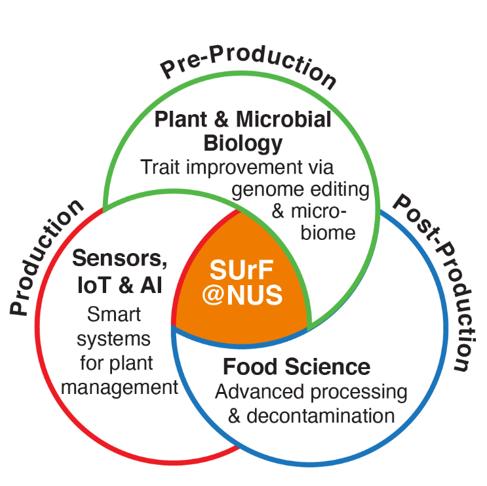Broad research scope of SUrF@NUS
SUrF is designed to help address various major scientific and technological gaps and challenges in the urban farming space through participation from NUS PIs spread across the diverse research areas as shown below.
-
Identify improved crop varieties for indoor farming
The available varieties are not ideal for indoor farming, because they were developed for outdoor cultivation. -
Identify better growth substrates
Growth substrates increase waste disposal needs. Also, in hydroponics cultivation, the root sensing of solid/soil surfaces is lacking, which can affect plant metabolism, their flavor compounds, texture and stress tolerance. -
Generate knowledge base of nutrients and nutraceuticals specific for indoor crops
The existing knowledge base of nutrients for indoor crops and the potential of enhancing nutraceuticals in the crops are essential areas of research focus. -
LED effects on growth, nutrient enhancement and decontamination
The use of different LED wavelengths spans production and post-production phases, including for decontamination. LED effects on plants beyond biomass yield, such as on quality (i.e., nutrients and nutraceuticals) should be studied. -
Beneficial microbiomes for plants
Natural microbial communities (microbiomes) around plants influence growth and plant products, almost to the same extent as what their genes provide the plants. Hence it is necessary to better understand the roles of plant microbiomes. -
Food science, technology and consumer health
The post-production processing and handling of food has profound effects on consumer health because they can influence nutrient composition and food product safety. Also, the shelf-life can be extended by proper processing technologies. -
Data science and AI for indoor farms
There are currently no data-driven solutions for optimizing plant growth and metabolism. It is essential to identify such solutions. -
Sensors and robotics
Smart sensors can help to monitor real-time growth and health of plants during various stages of cultivation. They can also provide valuable data for optimization of the production system. Innovative robotics solutions can facilitate automation of the different stages, such as pollination, harvesting and post-production handling.
This wide scope covers the three stages of food production aligned with Singapore’s national food program roadmap, where many NUS academics provided feedbacks. The phases are (i) Pre-production phase; (ii) Production phase, and (iii) Post-production phase.

“Developing agri-inputs that are tailored for the production environment”
Plant Biology & Microbiome Ecology
-
- Identify potential novel and resilient crop varieties for indoor farming based on Asian biodiversity. We will employ genetic and genomic strategies for variety improvement of selected crops. In addition to leafy vegetables, we will study crops such as tomatoes and other fruit/leguminous seed crops for indoor farming.
- Rapid genome engineered vegetable varieties for indoor/vertical systems. Alternatively, large scale genomics selection processes could also be adopted to identify new indoor/vertical farm adapted varieties.
- Microbiome solutions to improve plant growth, stress tolerance and induce flavors or textures into the crops.
Nutrition and Sustainable Inputs
-
- Nutrient and nutraceutical potentials of Asian vegetables for indoor farming. Generate a knowledge base of nutrients and the potential of enhancing the nutraceutical values of specific indoor crops.
- Waste-to-value added products for circular economy.
“Producing food sustainably and safely, while optimizing the use of limited resources”
Smart systems
-
- Intelligent farming systems based on networking, Internet of Things (IOT) in sensors, image processing, data science and human-computer/AI interaction. This would include sensors for early detection by biomarkers and image processing, remote sensing. In the long-term, it would be desirable to establish a benchmark/standard for smart, self-sustaining urban farm facility such that researchers from different domains can use it with minimal training, even from remote locations.
- Robotics for addressing production issues such as assisting pollination.
Health and pest management
-
- Novel biological and chemical-free control of pests and diseases.
- Better understanding of pest behaviors in indoor and/or vertical farming systems using the various sensors and biological data. This will lead to alternative pest management measures for indoor systems (e.g. light wavelength).
Production of alternative high value products
-
- New biotechnological products (eg. vaccines, high-value proteins, nutraceuticals) are possible examples
“Developing innovative solutions for shelf-life extension, nutrient enhancement and contaminant reduction”
Non-thermal & non-chemical decontamination
-
- Profiling of both pathogens and spoilage microorganisms for crops harvested in indoor farming.
- Novel decontamination by employing nonthermal methods without chemicals (e.g. LED technology and near-neutral acidified water technology).
- Dry and wet methods for scenario-based decontaminations. Depending on the type of produce and their subsequent storage condition, dry decontamination such as physical decontamination methods and wet decontamination that utilizes liquid-based solutions.
Nutrient enhancement
-
- Advanced processing technology for shelf-life extension of food crops of Asian importance. In-depth understanding of the physiological changes during various storage conditions is needed for the selected food crops. Multiple-objective optimization approach is essential to achieve shelf-life extension.
- Enhancement of targeted nutrients in food crops through innovative post-harvest processing technologies. The research by Food Science and Technology Department has demonstrated the feasibility of applying LED technology to simultaneously reduce pathogens and enhance nutrient content in some leafy green vegetables. This is amenable for further improvements and expansion to other crops.
